|
|
|
Sort Order |
|
|
|
Items / Page
|
|
|
|
|
|
|
| Srl | Item |
| 1 |
ID:
085994
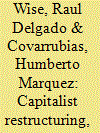

|
|
|
|
|
| Publication |
2008.
|
| Summary/Abstract |
The current dynamics of South to North migration flows can be explained by the nature of the ongoing process of capitalist restructuring, but in order to examine these issues we must approach them from the perspective of critical development studies. Mexican migration to the USA is paradigmatic of the regressive consequences of neoliberal structural adjustment policies and processes of regional integration based on access to cheap labour. From the lens of the political economy of development the dialectical relationship between development and migration can be analysed through three major movements: the dismantling and rearticulation of the productive apparatus, the creation of vast amounts of surplus population, well beyond the conventional formulation of the reserve army of the unemployed and the acceleration of migration flows. An examination of these issues leads us to conclude the following four facts: capitalist restructuring results in forced migration; immigrants contribute to capital accumulation in labour-receiving countries; migrants help sustain the fragile socioeconomic stability of the migrants' country of origin and, if used as a tool of social transformation, development can curtail forced migration.
|
|
|
|
|
|
|
|
|
|
|
|
|
|
|
|
| 2 |
ID:
085997


|
|
|
|
|
| Publication |
2008.
|
| Summary/Abstract |
This article focuses on the assumed relation between return migration, sustainability and development, in particular the role of NGO assistance and government policy herein. It is argued that a different approach to the relation between migration and development is needed both theoretically and policywise. Theoretically the need for a transnational approach based on the everyday epistemologies of refugees and their need for a sense of belonging is highlighted. Building on this, the article emphasises the importance of defining sustainability of return through the use of the concept of mixed embeddedness, and the different factors that influence this embeddedness. Policywise the current convenient application of the Siamese twins, Migration and Development, to involuntarily return is strongly criticised. In doing so the inconsistencies in governmental policy are emphasised. Lastly, the article calls for a more cautious way of linking migration and development, both by NGOs and governments.
|
|
|
|
|
|
|
|
|
|
|
|
|
|
|
|
| 3 |
ID:
085989


|
|
|
|
|
| Publication |
2008.
|
| Summary/Abstract |
This paper offers a first attempt at discussing the linkages between migration and development in reference to the feminisation of intra-regional migratory flows in Asia. It begins with a summary of the current debate on the 'migration and development nexus' with two objectives in mind: 1) to assess this debate's relevance to intra-regional migration in Asia; and 2) to redirect attention to the social dimension of feminised migrations and its relationship to development. In doing so, the focus is on the individual and family level to discuss the impact of migration on personal development as well as on interpersonal relations. What follows thereafter is a brief summary of the character and context of feminised migration in Asia, by approaching this issue from an intra-regional (that is migratory moves of Asians within Asia) perspective. The final section links the previous discussion to the issue of rights. The article concludes that the conceptual and normative linkages between women's social and economic rights as they relate to migration need further exploration, eg by way of specific case studies or ethnographic research. This is needed for relevant policy reform and implementation.
|
|
|
|
|
|
|
|
|
|
|
|
|
|
|
|
| 4 |
ID:
085992
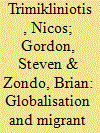

|
|
|
|
|
| Publication |
2008.
|
| Summary/Abstract |
This paper focuses on the processes of localised and globalised racialisation of migrant workers in South Africa, which have allowed it to treat the question of free movement, migration and integration more or less in the image of Europe. The 'rainbow nation' seems to be racialising and excluding the 'xenos' based on the apartheid legacy's treatment of migrant black labour. Moreover, the myth of the 'weak state' serves to cover up the power of capital, which is benefiting from the drive to informalisation and the irregular/undeclared work of undocumented workers. Trade unions have failed to organise migrant workers, initially reacting defensively, but now increasingly recognising that migrant workers must be incorporated in the movement and their rights defended for the benefit of all workers. If trade unions look at the European and US experience they will find similar dilemmas but also strategies for incorporation in the unions. Finally the paper looks at future challenges beyond racialisation and xenophobia.
|
|
|
|
|
|
|
|
|
|
|
|
|
|
|
|
| 5 |
ID:
085983
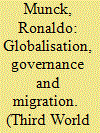

|
|
|
|
|
| Publication |
2008.
|
| Summary/Abstract |
Migration exposes a central inconsistency in neoliberal globalisation because, if capital, money, information and knowledge should all flow freely across the globe, then why not people? This broad introductory survey begins with a critical review of perspectives that pose migration as a global governance problem and the migrant as a potential terrorist. It then moves on to interrogate the sometimes facile declarations that we are living in the age of migration without setting this in either historical or geographical context. It explores the gender, race and class dimensions of migration, which is in reality a far from homogenous flow. Then, after opening up the migration/development problematic to move it beyond a zero-sum game, it ends with a review of the limitations of the dominant migration management paradigm. It advocates throughout a Southern perspective on migration in contrast to the Northern bias of the dominant discourses. This is a necessary step, I would argue, for moving towards a holistic critical analysis of migration on a global scale.
|
|
|
|
|
|
|
|
|
|
|
|
|
|
|
|
| 6 |
ID:
085985
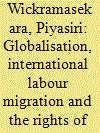

|
|
|
|
|
| Publication |
2008.
|
| Summary/Abstract |
The aim of the paper is to highlight the gaps between policy and practice in the current discourse on international migration and its links with development. It contends that a major cause of the limited development impact of migration is the 'closed door policy' of major destination countries on the admission of low-skilled migrant workers from developing countries. The paper addresses the weak foundations and major consequences of this policy: the denial of labour demand, channelling a large part of flows to irregular migration, consequent exploitation and violation of rights of migrant workers, and accelerated brain drain from developing countries. While there is increasing emphasis on temporary migration policies and programmes for low skilled labour, achievements on the ground have been quite limited. The movement towards a global migration regime which can address current pressing issues has also not progressed beyond broad consultative forums. There is an imperative need for fresh approaches and bold initiatives to promote international labour mobility for the welfare of the global community.
|
|
|
|
|
|
|
|
|
|
|
|
|
|
|
|
| 7 |
ID:
085621
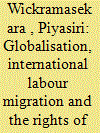

|
|
|
|
|
| Publication |
2008.
|
| Summary/Abstract |
The aim of the paper is to highlight the gaps between policy and practice in the current discourse on international migration and its links with development. It contends that a major cause of the limited development impact of migration is the 'closed door policy' of major destination countries on the admission of low-skilled migrant workers from developing countries. The paper addresses the weak foundations and major consequences of this policy: the denial of labour demand, channelling a large part of flows to irregular migration, consequent exploitation and violation of rights of migrant workers, and accelerated brain drain from developing countries. While there is increasing emphasis on temporary migration policies and programmes for low skilled labour, achievements on the ground have been quite limited. The movement towards a global migration regime which can address current pressing issues has also not progressed beyond broad consultative forums. There is an imperative need for fresh approaches and bold initiatives to promote international labour mobility for the welfare of the global community
|
|
|
|
|
|
|
|
|
|
|
|
|
|
|
|
| 8 |
ID:
085987
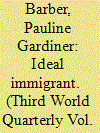

|
|
|
|
|
| Publication |
2008.
|
| Summary/Abstract |
Drawing upon transnational multi-sited research analysing sending and receiving aspects of migration flows and the shifting priorities of neoliberal citizenship regimes, this article highlights the class complexity of Philippine gendered migration pathways to Canada. Migrant agency and class complexity are linked to neoliberal immigration and labour export policies that privilege the acquisition of capital serving the interests of sending and receiving countries. Sometimes this benefits elite migrants but it also exacerbates gendered class cleavages between migrants and within Philippine society. The histories of Philippine internal and overseas migration have contributed to a culture of migration whereby Filipinos exhibit flexibility to draw advantage from subtle shifts in Canadian immigration policy. The paper concludes that Filipinos may well represent the ideal immigrant but there are personal, social, and political consequences for migrants and the nation.
|
|
|
|
|
|
|
|
|
|
|
|
|
|
|
|
| 9 |
ID:
085993


|
|
|
|
|
| Publication |
2008.
|
| Summary/Abstract |
While there has been an explosion of academic and practitioner interest in the relationship between migration and development in the past decade, this article poses the neglected question of what is meant by development in this literature. It focuses on the ideas of development underpinning development interventions across Africa and shows how they have sedentary roots which are focused on the control of mobility and tend to cast migration as a symptom of development failure. This can be seen in the ongoing ambivalence of many development actors towards migration across Africa. The article argues that the current initiatives to link migration and development will remain fundamentally flawed until the concept of development is reconceptualised for a mobile world. In particular, it calls for the reconsideration of the ideas of the good life envisaged in development initiatives, moving beyond models of development based on the nation-state and abandoning the paternalist paradigms that fail to recognise the agency of migrants from poor countries.
|
|
|
|
|
|
|
|
|
|
|
|
|
|
|
|
| 10 |
ID:
085998


|
|
|
|
|
| Publication |
2008.
|
| Summary/Abstract |
Temporary migration for agricultural work has long historical provenance globally, and has increased in the most recent period of globalisation. In this paper, using examples based on my own research on both cross-border (to the UK) and internal (within India) migration by workers for temporary agricultural jobs, I raise questions about how such movements, and the labour relations with which they are associated, have been represented in global and regional analyses. The discussion is set within a summary of recent debates over the usefulness of the concept of geographical scale. I use as a case study the ILO's 2005 report, Global Alliance Against Forced Labour, which makes a clear association between temporary migrant work in agriculture and forced labour in rural Asia. I argue that the representations of forced labour that emerge from the report risk, first, painting temporary migrants as victims, rather than as knowledgeable agents, and, second, residualising unfree labour relations, rather than shedding light on their connections to context-specific and contingent forms of capitalism and capital-state relations.
|
|
|
|
|
|
|
|
|
|
|
|
|
|
|
|
| 11 |
ID:
085990


|
|
|
|
|
| Publication |
2008.
|
| Summary/Abstract |
African migration to Europe is commonly seen as a tidal wave of desperate people fleeing poverty and warfare at home trying to enter the elusive European el Dorado. Typical 'solutions' proposed by politicians include increasing border controls or boosting African 'stay-at-home' development. However, such apocalyptic views are based on fundamentally flawed assumptions about the (limited) magnitude, historicity, nature and causes of this migration. Dominant discourses obscure the fact that African migration to Europe and Libya is fuelled by a structural demand for cheap migrant labour in informal sectors. This explains why restrictive immigration policies have invariably failed to stop migration and have had various perverse effects. African development is also unlikely to curb migration as it will enable and inspire more people to migrate. Despite lip service being paid to 'combating illegal migration' for political and diplomatic reasons, neither European nor African states have much genuine interest in stopping migration.
|
|
|
|
|
|
|
|
|
|
|
|
|
|
|
|
| 12 |
ID:
085996


|
|
|
|
|
| Publication |
2008.
|
| Summary/Abstract |
This article traces the emergence of a new trend within the international community-the global remittance trend (grt)-and undertakes a critical gender analysis of the mainstream framing within it. The grt refers to the heightened interest of different actors-such as governments, international organisations, non-governmental organisations and private sector actors-in the development potential of international migration and remittances, and in the strategies designed to harness this potential. The main argument advanced is that in the debate about the framing of the grt gender dimensions have been largely absent and the mainstream framing is generally gender-blind. At the same time, however, it is infused with gendered representations and stereotypes, which have concrete gender-specific implications in terms of policy making. Illustrated with an example from rural Mexico, the paper demonstrates how policies based on such representations lead to complex and seemingly contradictory processes of gender exclusion and inclusion within the grt, and may have adverse gender implications.
|
|
|
|
|
|
|
|
|
|
|
|
|
|
|
|
| 13 |
ID:
085999


|
|
|
|
|
| Publication |
2008.
|
| Summary/Abstract |
Illegal migration- also known as clandestine, undocumented or irregular migration-appears frequently in contemporary popular and political discourses; yet there is relatively little theoretical literature on the phenomenon. Nearly all academic and other discussions of the topic take as axiomatic that illegal migration is a 'problem', without pausing to question its rapid rise to prominence and the underlying issues that may be involved. It is the aim of this paper to search a little deeper into the historical and structural factors germane to the phenomenon: little attention will be paid to detailed empirical matters, since such information is available elsewhere. I start with some definitional issues then, taking an overview of the history of migration controls, I proceed to a discussion of the complex structural factors that have contributed to the emergence of illegal migration as a putative 'crisis' in the developed world.
|
|
|
|
|
|
|
|
|
|
|
|
|
|
|
|
| 14 |
ID:
085995


|
|
|
|
|
| Publication |
2008.
|
| Summary/Abstract |
This article sets out to challenge the dominant perspective on the nexus between migration and security. In particular since the terrorist attacks on 11 September 2001 the discourse on migrants has been increasingly 'securitised'. Migrants are seen as potential terrorists and thus constitute a security risk for the state. Taking the vantage point of migrants the present article introduces another nexus: the migration-insecurities nexus. It argues that migration as a social process is embedded in violence and insecurities. To start, the mal- or underdevelopment in sending regions has caused many people to migrate-in other words, migration is in part a consequence of the 'violence of development'. However, the insecurities related to the migratory process do not end with the initial moment of departure-they extend to the entire migratory experience, ranging from crossing borders to being subjected to abuse and discrimination at the workplace and the risk of being deported. Additionally, family members and communities of origin are not exempt from being exposed to multiple insecurities. In sum, the article presents a different take on migration as a potential security risk, using Mexican migration to the USA as example.
|
|
|
|
|
|
|
|
|
|
|
|
|
|
|
|
|
|
|
|
|